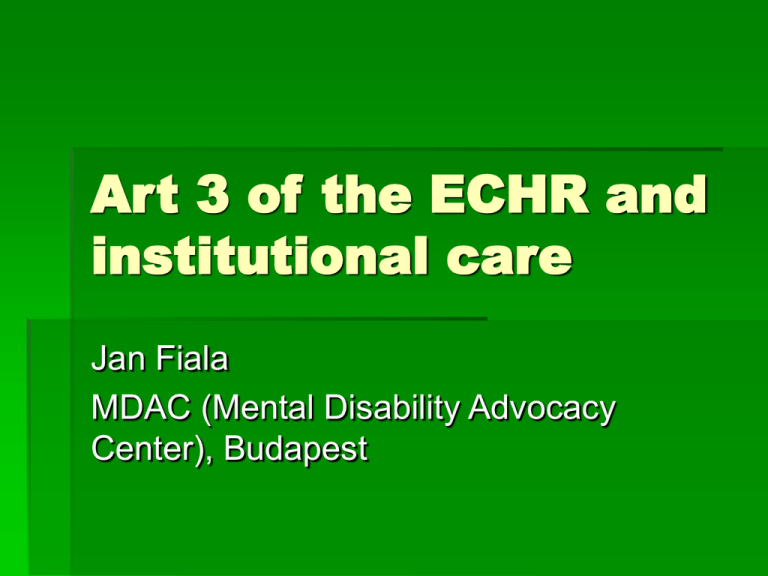
Art 3 of the ECHR and
institutional care
Jan Fiala
MDAC (Mental Disability Advocacy
Center), Budapest
Article 3 of the European
Convention on Human Rights:
3. No one shall be subjected to torture or
to inhuman and degrading treatment and
punishment
This presentation talks
about
Basic standards of Article 3 jurisprudence in
other areas
Violations of Article 3 in places of detentions:
1. Conditions of detention
2. Specific acts of ill-treatment
3. Not providing the necessary care and
accommodation
Questions of proof and evidence
Article 3
3. No one shall be subjected to torture or
to inhuman and degrading treatment and
punishment
Some definitions (Ireland v. the
United Kingdom):
Torture: deliberate inhuman treatment causing
very serious and cruel suffering
Inhuman treatment or punishment: intense
physical or mental suffering
Degrading treatment or punishment: arouses in
the victim feelings of fear, anguish and
inferiority capable of humiliation and
debasement and possibly breaking physical or
moral resistance
Torture
Special stigma attached
Rare – so far not found in connection with
people with mental disabilities
Some examples: Palestinian hanging (Aksoy v.
Turkey); severe forms of beating (Selmouni v.
France, Dikme v. Turkey); severe beatings,
combined with denial of medical treatment
(Ilhan v. Turkey); electric shocks (Akkoc v.
Turkey); rape (Aydin v. Turkey); falaka/falanga:
beatings on the soles of the feet (Salman v.
Turkey, Greek case), Force-feeding
(Nevmerzhitsky v. Ukraine)
Is every ill-treatment TIDTP?
Must attain a minimum level of severity.
Relative standard, depends on the
circumstances of the case - duration of
the treatment, its physical or mental
effects, sex, age and state of health of
the victim (Ireland v. UK, para. 162)
Intention: its absence cannot conclusively
rule out a finding of violation
The state’s obligations
under Article 3:
Not to subject people to TIDTP
Protect people from TIDTP committed by
other individuals
Investigate allegations of TIDTP
Violations of Article 3
1. Conditions of detention
2. Specific acts of ill-treatment
3. Not providing the necessary care and
accommodation
1. Conditions of detention
So far no cases concerning psychiatric
hospitals or social care homes
Violations found in detention centres,
police cells, prisons,…
Factors in determining
inadequate conditions of
detention:
Overcrowding
Lack of sleep
Toilets, showers (partitions, accessibility,
paper)
Cleanness (rooms, sheets, laundry)
Food
Ventilation
Heat, cold
Lack of outdoor activities
General hygiene, insects, diseases
Cumulative effect:
“When assessing conditions of detention,
account has to be taken of the
cumulative effects of these conditions, as
well as of specific allegations made by
the applicant” (Dougoz v. Greece, para.
46)
Examples:
Labita v. Italy
Dougoz v. Greece
Peers v. Greece
Valasinas v. Lithuania
Kalashnikov v. Russia
Kehayov v. Bulgaria
Nevmerzhitsky v. Ukraine
Karalevicius v. Lithuania
Overcrowding
“…the Court recalls that the European
Committee for the Prevention of Torture
and Inhuman or Degrading Treatment of
Punishment (“the CPT”) has set 7 m² per
prisoner as an approximate, desirable
guideline for a detention cell (see the 2nd
General Report - CPT/Inf (92) 3, § 43)” –
(Kalashnikov v. Russia, para. 97 –
misquoted the CPT!)
The resource defence
Lack of resources: not a valid excuse for
overcrowdedness or poor hygiene
There is a duty on states to organise their
detention system in such a way as to
comply with the requirements of Art 3
In length of detention cases: Mussi v.
Italy, Sussmann v. Germany
CPT, 2nd general report, para. 44: “Illtreatment can take numerous forms,
many of which may not be deliberate but
rather the result of organisational failings
or inadequate resources.”
Article 3 of the European
Convention on Human Rights:
3. No one shall be subjected to torture or
to inhuman and degrading treatment and
punishment
3.2 There shall be no interference with
the exercise of this right except if it is too
expensive to maintain humane conditions
of detention.
How does it look in
hospitals:
Aerts v. Belgium, para. 23: “When we visited
the common room the occupants stated that::
there were too many of them;
they had nothing to do;
they spent all day in the day-room, which
seemed a very long time to them;
it was very hot;
they did not have enough air because the
windows were never opened;
they were entitled to only one visit per week for
an hour and a half;
they were not allowed to use the telephone;
they could change their clothes only very
rarely;
they were sent all the misfits from other places;
there were not enough supervisors (three
during the week, and often fewer at the
weekend);
they had regular contact with the psychiatrist
and were on very good terms with
him. ”
2. Specific acts of illtreatment
Beatings (Labita, Dikme)
Rape (Aydin v. Turkey)
Body search (Valasinas)
Electric shocks (Aksoy, Akkoc, Mikheyev)
Intentional humiliation (Labita, Selmouni)
Shaving of hair (Yankov)
(Lack of) medical treatment (Ilhan)
(Lack of) protection (Edwards)
Segregation (Herczegfalvy, Keenan)
Strapping to bed, handcuffing (Herczegfalvy, Henaf)
Force-feeding, overmedication (Nevmerzhitsky)
Beatings and physical
violance
Tomasi v. France: “Any use of physical
force in respect of a person deprived of
his liberty which is not made strictly
necessary as a result of his own conduct
violates human dignity and must
therefore be regarded as a breach of the
right guaranteed under Article 3 (art. 3) of
the Convention.”
Shaving of head
Yankov v. Bulgaria, para. 112: “the forced
shaving off of a prisoner's hair …consists
in a forced change of the person's
appearance by the removal of his hair.
The person undergoing that treatment is
very likely to experience a feeling of
inferiority as his physical appearance is
changed against his will”
Para. 117: “…even if it was not intended
to humiliate, the removal of the
applicant's
hair
without
specific
justification contained in itself an arbitrary
punitive element and was therefore likely
to appear in his eyes to be aimed at
debasing and/or subduing him.”
Lack of protection
Edwards v. UK, para. 47:”…there was a
breach of the positive obligation imposed
on the authorities to protect the life of
their son. Although the scope of such a
positive obligation might vary, it was
particularly stringent where an individual
died in custody.”
Lack of healthcare
Keenan v. UK, para. 111: “…. the
authorities are under an obligation to
protect the health of persons deprived of
liberty. The lack of appropriate medical
care may amount to treatment contrary to
Article 3.”
Seclusion
CPT’s 8 th deneral report, para. 49: “There is a
clear trend in modern psychiatric practice in
favour of avoiding seclusion of patients...
For so long as seclusion remains in use, it
should be the subject of a detailed policy
spelling out, in particular: the types of cases in
which it may be used; the objectives sought; its
duration and the need for regular reviews; the
existence of appropriate human contact; the
need for staff to be especially attentive.
Seclusion should never be used as a
punishment.
Seclusion
Keenan v. UK, Para 116: The belated
imposition on him in those circumstances of a
serious disciplinary punishment – seven days’
segregation in the punishment block …is not
compatible with the standard of treatment
required in respect of a mentally ill person. It
must be regarded as constituting inhuman and
degrading treatment and punishment within the
meaning of Article 3 of the Convention.
Handcuffing to bed Herczegfalvy
Para. 13: “he was extremely aggressive”
Para. 79: “[H]e had been forcibly
administered food and neuroleptics,
isolated and attached with handcuffs to a
security bed during the weeks following
the incident of 15 January 1980…”
Para. 82: “…the position of inferiority and
powerlessness which is typical of patients
confined in psychiatric hospitals calls for
increased vigilance in reviewing whether the
Convention has been complied with. While it is
for the medical authorities to decide, on the
basis of the recognised rules of medical
science, on the therapeutic methods to be
used, if necessary by force, to preserve the
physical and mental health of patients who are
entirely incapable of deciding for themselves
and for whom they are therefore responsible,
such patients nevertheless remain under the
protection of Article 3 (art. 3), whose
requirements permit of no derogation.”
Para. 82: “The established principles of
medicine are admittedly in principle
decisive in such cases; as a general rule,
a measure which is a therapeutic
necessity cannot be regarded as
inhuman or degrading. The Court must
nevertheless satisfy itself that the
medical necessity has been convincingly
shown to exist.”
Medical necessity: “a measure which is a
therapeutic necessity cannot be regarded
as inhuman and degrading.” – is there
only one standard? Which doctor
decides?
Handcuffing to bed - Henaf
Para. 55: “…certain acts previously
falling outside the scope of Article 3 might
in future attain the required level of
severity.”
Para. 56: “…the Court considers that the
use of restraints was disproportionate to
the needs of security, particularly as two
police officers had been specially placed
on guard outside the applicant's room.”
Physical restraints
CPT, 8th General Report, para. 48: “Resort to
instruments of physical restraint (straps, straitjackets, etc.) shall only very rarely be justified
and must always be either expressly ordered
by a doctor or immediately brought to the
attention of a doctor with a view to seeking his
approval. If, exceptionally, recourse is had to
instruments of physical restraint, they should
be removed at the earliest opportunity; they
should never be applied, or their application
prolonged, as a punishment.”
Physical restraints
CPT, 8th General Report, para. 48: “The
CPT has on occasion encountered
psychiatric patients to whom instruments
of physical restraint have been applied
for a period of days; the Committee must
emphasise that such a state of affairs
cannot have any therapeutic justification
and amounts, in its view, to ill-treatment.”
Force-feeding
Herczegfalvy v. Austria, para. 79: “[H]e
had been forcibly administered food and
neuroleptics, isolated and attached with
handcuffs to a security bed during the
weeks following the incident of 15
January 1980…”
Force-feeding
Nevmerzhitsky v. Ukraine, para. 96: no
medical report on the necessity of forcefeeding
“[T]he force-feeding of the applicant,
without any medical justification having
been shown by the government,
…resisted by the applicant, constituted
treatment of such a severe character
warranting the characterisation of torture.
Electro-shocks
…the CPT has expressed particular
concern about ECT (Electroconvulsive
therapy) in unmodified form (i.e. without
anaesthetic and muscle relaxants). It is of
the opinion that this method can no
longer be considered as acceptable in
modern psychiatric practice (8th General
Report of the CPT, para. 39).
Other methods of
“therapy”?
Showers (too much, too little)
Deprivation of toys, food
No access to family
Seclusion, restraints
Cleaning work
Rape
3. Lack of care and
accommodation
Keenan
Price
McGlinchey
Aerts
Kudla
Bensaid
Salkic
Keenan v. UK
Mark Keenan suffered from a psychiatric
illness. He was serving a 4 months
sentence in prison. He was given
disciplinary punishment of 28 days
segregation 9 days before discharge. He
committed suicide by hanging himself.
Keenan v. UK
Para 116: “The belated imposition on him in
those circumstances of a serious disciplinary
punishment – seven days’ segregation in the
punishment block and an additional twentyeight days to his sentence imposed two weeks
after the event and only nine days before his
expected date of release… is not compatible
with the standard of treatment required in
respect of a mentally ill person.”
Price v. UK
Adele Price was a four-limb deficient
thalidomide victim with kidney problems.
She was sentenced to 7 days immediate
imprisonment for contempt of court. The
first day she had to spend in a police
station, which was not prepared to
accommodate people with disabilities.
Price v. UK
Para. 30: “There is no evidence in this case of
any positive intention to humiliate or debase
the applicant. However, the Court considers
that to detain a severely disabled person in
conditions where she is dangerously cold, risks
developing sores because her bed is too hard
or unreachable, and is unable to go to the toilet
or keep clean without the greatest of difficulty,
constitutes degrading treatment contrary to
Article 3 of the Convention.”
McGlinchey v. UK
Judith McGlinchey was a heroin addict
with severe withdrawal symptoms
detained in prison, where she died as
result of vomiting and dehydration
McGlinchey v. UK
Para. 57: “[B]y the morning of 14 December
1998 Judith McGlinchey, a heroin addict whose
nutritional state and general health were not
good on admission to prison, had suffered
serious weight loss and was dehydrated... This
situation, in addition to causing Judith
McGlinchey distress and suffering, posed very
serious risks to her health, as shown by her
subsequent collapse. Having regard to the
responsibility owed by prison authorities to
provide the requisite medical care for detained
persons, the Court finds that in the present
case there was a failure to meet the standards
imposed by Article 3 of the Convention.
Aerts v. Belgium
Detention of a mentally ill person in a
prison because of no free space in
psychiatric hospital
Para. 61: “In the present case the
applicant had literally been left to his own
devices and had not received any regular
medical or psychiatric attention.”
Aerts v. Belgium
Para. 66.: “In the present case there is no
proof of a deterioration of Mr Aerts’s
mental health. The living conditions on
the psychiatric wing at Lantin do not
seem to have had such serious effects on
his mental health as would bring them
within the scope of Article 3.”
Kudla v. Poland
Applicant suffering from severe
depression was detained in prison
without adequate psychiatric care. He
repeatedly attempted to commit suicide.
Kudla v. Poland
Para. 94: “…the State must ensure that a
person is detained in conditions which are
compatible with respect for his human dignity,
that the manner and method of the execution
of the measure do not subject him to distress
or hardship of an intensity exceeding the
unavoidable level of suffering inherent in
detention and that, given the practical
demands of imprisonment, his health and wellbeing are adequately secured by, among other
things, providing him with the requisite medical
assistance.”
Kudla v. Poland
Para. 99: “the very nature of the applicant's
psychological condition made him more
vulnerable than the average detainee and …
his detention may have exacerbated to a
certain extent his feelings of distress, anguish
and fear. …[F]rom 11 June to 29 October 1996
the applicant was kept in custody despite a
psychiatric opinion that continuing detention
could jeopardise his life because of a likelihood
of attempted suicide.”
Bensaid v. UK
Proposed expulsion to Algeria of a
person suffering from severe
schizophrenia.
Bensaid v. UK
Para. 38: “…medical treatment is
available to the applicant in Algeria. The
fact that the applicant's circumstances in
Algeria would be less favourable than
those enjoyed by him in the United
Kingdom is not decisive from the point of
view of Article 3 of the Convention.”
Salkic v. Sweden
Applicant Muslim family suffered from
psychiatric problems (post-traumatic
disorder because of the Bosnian was),
and claimed that there are no adequate
psychiatric facilities in Bosnia to prevent
them from suicide.
Salkic v. Sweden
“…even though mental health care in Bosnia
and Herzegovina clearly is not of the same
standard as in Sweden, there are health care
centres which include mental health units and
there are apparently several on-going projects
to improve the situation. In any event, the fact
that the applicants’ circumstances in Bosnia
and Herzegovina are less favourable than
those enjoyed by them while they were in
Sweden cannot be regarded as decisive from
the point of view of Article 3.”
Evidentiary rules
Beyond reasonable doubt – very high,
often criticised
The Court can draw inferences from
certain facts (Tomasi v. France)
Non-investigation: separate violation and
also a prima-facie evidence of substantial
violation
The standard
Nevmerzhitsky v. Ukraine, para. 72: “The
Court reiterates that, in assessing
evidence, it adopts the standard of proof
“beyond reasonable doubt”. Such proof
may follow from the coexistence of
sufficiently strong, clear and concordant
inferences or of a similar unrebutted
presumptions of fact.”
Mikheyev v. Russia, para. 102: „…where the
events in issue lie wholly, or in large part, within
the exclusive knowledge of the authorities, as
in the case of persons within their control in
custody (as in the present case), strong
presumptions of fact will arise in respect of
injuries occurring during such detention. In
such cases the burden of proof may be
regarded as resting on the authorities to
provide a satisfactory and convincing
explanation... In the absence of such
explanation the Court can draw inferences
which may be unfavourable for the respondent
Government.”
Inferences – shift of the
burden of proof (?)
Tomasi v. France (27.8.1992), para. 115: [The
Court] finds it sufficient to observe that the
medical certificates and reports, drawn up in
total independence by medical practitioners,
attest to the large number of blows inflicted on
Mr Tomasi and their intensity; these are two
elements which are sufficiently serious to
render such treatment inhuman and degrading.
Selmouni v. France, para. 87: “The Court
considers that where an individual is
taken into police custody in good health
but is found to be injured at the time of
release, it is incumbent on the State to
provide a plausible explanation of how
those injuries were caused, failing which
a clear issue arises under Article 3 of the
Convention.”
What if the medical report
does not help?
Aidyin v. Turkey, 25.9.1997, para. 107: „The
Court notes that the requirement of a thorough
and effective investigation into an allegation of
rape in custody at the hands of a State official
also implies that the victim be examined, with
all appropriate sensitivity, by medical
professionals with particular competence in this
area and whose independence is not
circumscribed by instructions given by the
prosecuting authority as to the scope of the
examination. It cannot be concluded that the
medical examinations ordered by the public
prosecutor fulfilled this requirement.”
Akkoc v. Turkey, judgment 10.10.2000 , para. 118: “The
Court further endorses the comments expressed by the
Commission concerning the importance of independent
and thorough examinations of persons on release from
detention. The European Committee for the Prevention
of Torture (CPT) has also emphasised that proper
medical examinations are an essential safeguard
against ill-treatment of persons in custody. Such
examinations must be carried out by a properly
qualified doctor, without any police officer being
present and the report of the examination must include
not only the detail of any injuries found, but the
explanations given by the patient as to how they
occurred and the opinion of the doctor as to whether
the injuries are consistent with those explanations. The
practices of cursory and collective examinations
illustrated by the present case undermines the
effectiveness and reliability of this safeguard.
Example of CPT reference
Nevmerzhitsky v. Ukraine, para. 86:
“taking into account that the applicant’s
submissions are consistent, thorough
and correspond in general to the
inspections of the pre-trial detention
centres in Ukraine conducted by CPT
and the Commissioner of Human
Rights…” the Court finds a violation of
Article 3.
This presentation talked
about
Basic standards of Article 3 jurisprudence in
other areas
Violations of Article 3 in places of detentions:
1. Conditions of detention
2. Specific acts of ill-treatment
3. Not providing the necessary care and
accommodation
Questions of proof and evidence
List of cases
Aerts v. Belgium, judgment 30.7.1998, 25357/94
Akkoc v. Turkey, judgment 10.10.2000, 22947/93 and
22948/93
Aksoy v. Turkey (1), judgment 18.12.1996, 21987/93
Aydin v. Turkey, judgment 25.9.1997, 23178/94
Bensaid v. the United Kingdom, judgment 6.2.2001,
44599/98
Dougoz v. the Greece, judgment 6.3.2001, 40907/98
Paul and Audrey Edwards v. the United Kingdom,
judgment 14.3.2002, 46477/99
List of cases
Hénaf v. France, judgment 27.11.2003, 65436/01
Herczegfalvy v. Austria, judgment 24.9.1992, 10533/83
Kalashnikov v. Russia, judgment 15.7.2002, 47095/99
Karalevicius v. Lithuania, judgment 7.4.2005, 53254/99
Keenan v. the United Kingdom, judgment 3.4.2001,
27229/95
Kehayov v. Bulgaria, judgment 18.1.2005, 41035/98
Kudla v. Poland, judgment 26.10.2000, 30210/96
Labita v. Italy, judgment 6.4.2000, 26772/95
List of cases
McGlinchey and Others v. the United Kingdom,
judgment 29.4.2003, 50390/99
Mikheyev v. Russia, judgment 26.1.2006, 77617/01
Price v. the United Kingdom, judgment 10.7.2001,
33394/96
Peers v. Greece, judgment 19.4.2001, 28524/95
Salkic and Others v. Sweden, admissibility decision
29.6.2004, 7702/043
Selmouni v. France, judgment 28.7.1999, 25803/94
Slimani v. France, judgment 27.7.2004, 57671/00
Tomasi v. France, judgment 27.8.1992, 12850/87
Valasinas v. Lithuania, judgment 24.7.2001, 44558/98
Yankov v. Bulgaria, judgment 11.12.2003, 39084/97
Art 3 of the ECHR and
institutional care
Jan Fiala
MDAC (Mental Disability Advocacy
Center), Budapest
jfiala@mdac.info
Thank you for your attention!









